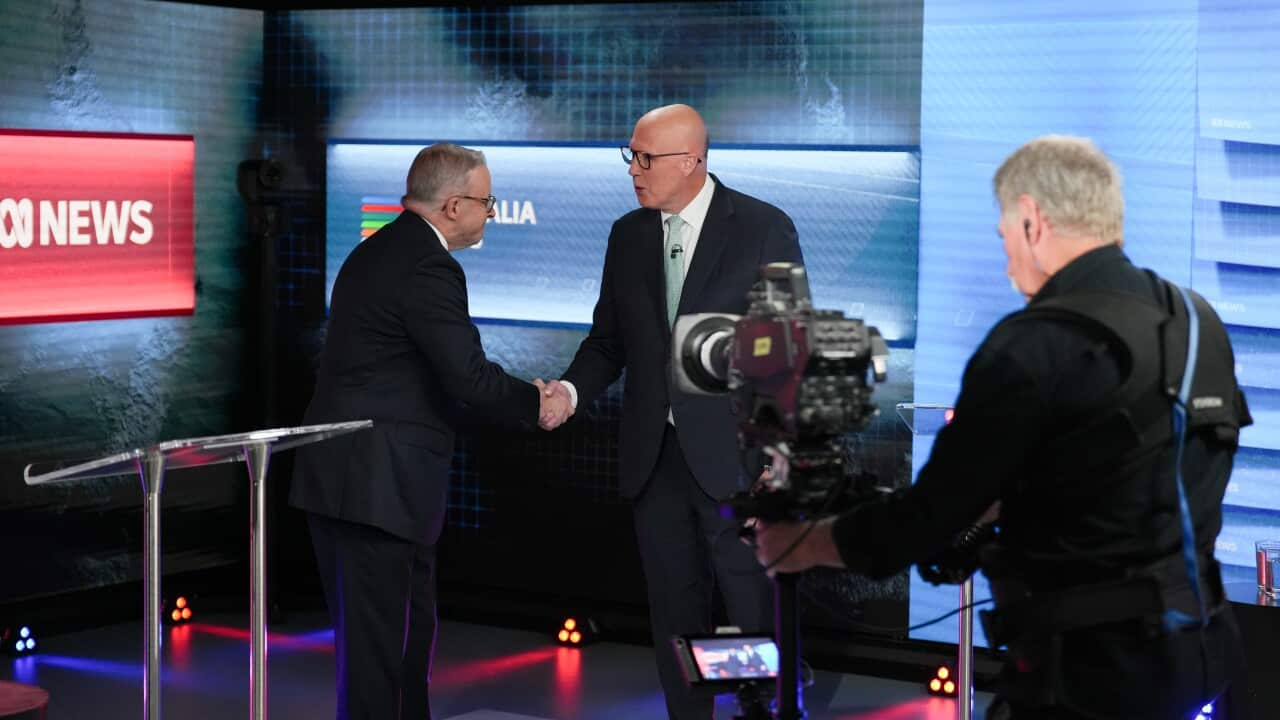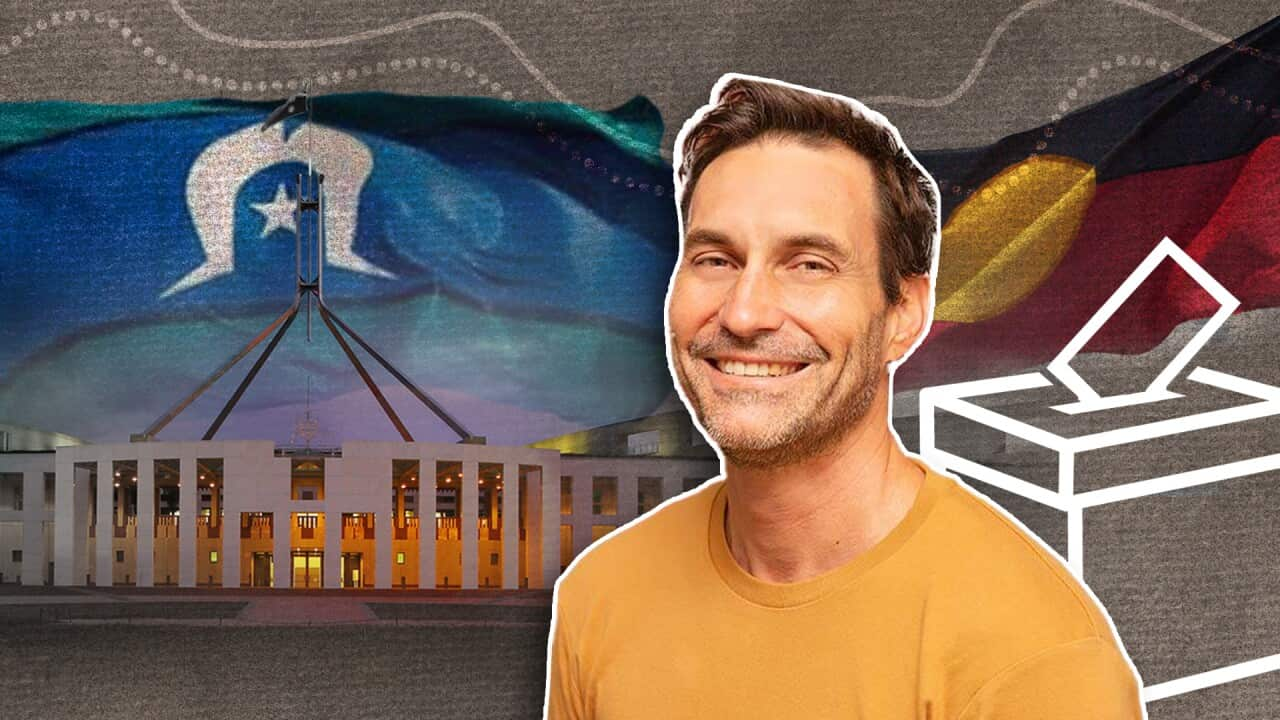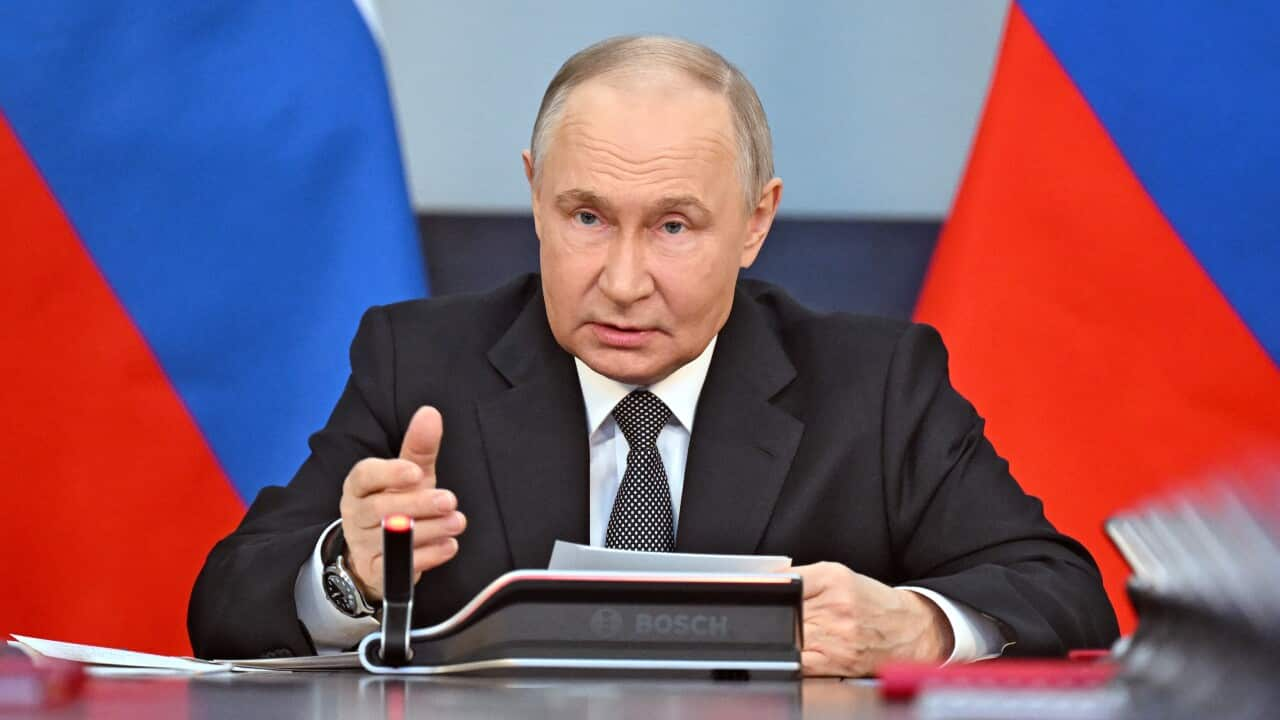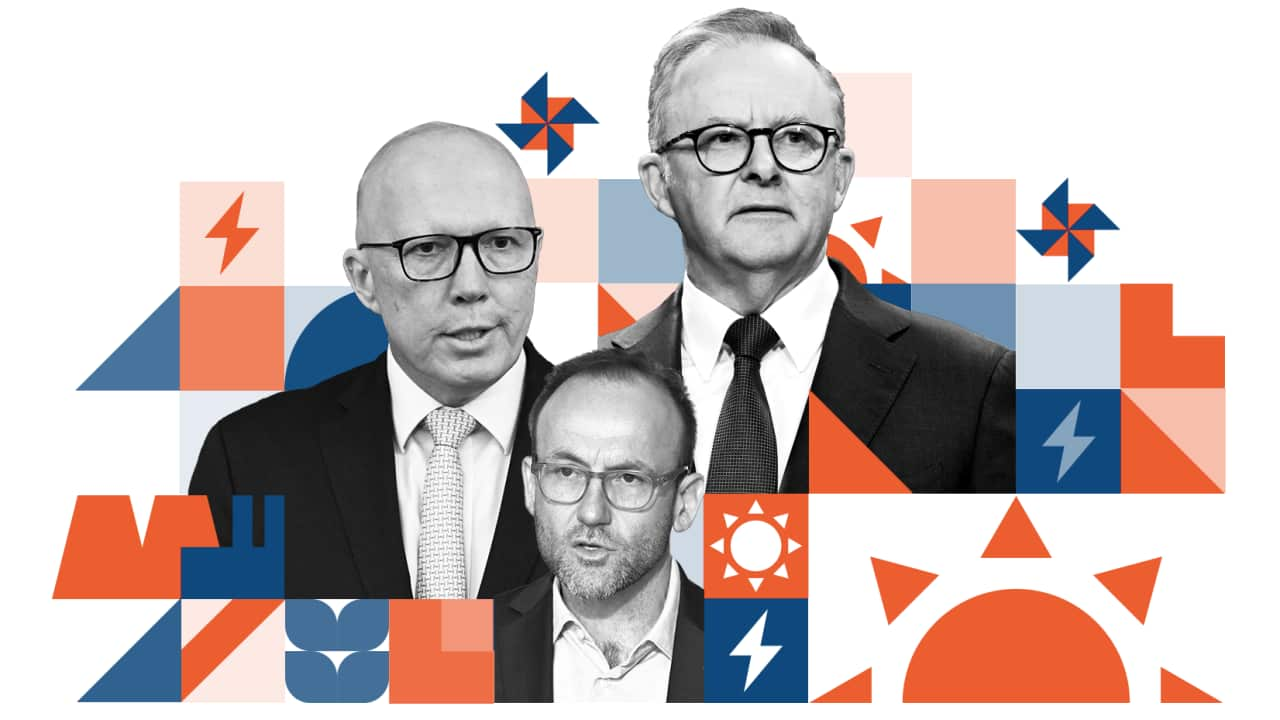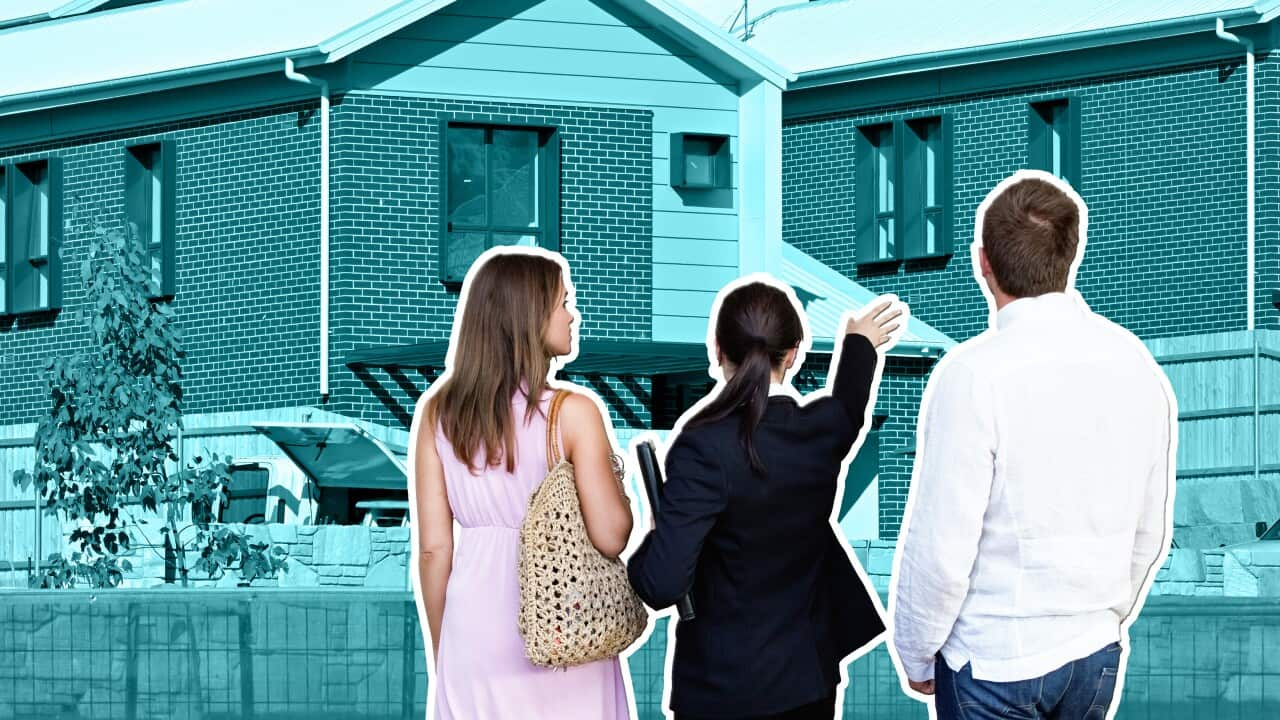Prime Minister Anthony Albanese and Opposition leader Peter Dutton have faced off in their second debate of the federal election campaign.
The debate took place in the Sydney suburb of Parramatta and ABC moderator David Speers grilled the leaders while they stood at their personal lecterns.
Ahead of the debate, pro-Palestinian protesters gathered outside the ABC studios.
Read our story below on how the debate unfolded.
What have we learned?
After an hour of debate between the two leaders, we have heard a plethora of carefully crafted lines that have permeated the campaign.
Neither leader landed a serious blow, but there were some highlights:
Debate post-match: Chalmers accuses Dutton of climate change denial
Treasurer Jim Chalmers was sent out after the debate for a wash-up press conference, and said Dutton was "slithering and sliding" to avoid revealing his budget cuts, and his answers revealed "he doesn't believe in the science of climate change".
"Peter Dutton couldn't come clean on his cuts. Peter Dutton was slithering and sliding on cuts," he said.
Chalmers also defended Albanese's statement that his government did not model an overhaul of negative gearing, despite Chalmers confirming last year that Treasury officials had provided advice on the policy.

Jim Chalmers has accused Peter Dutton of being a climate change denier. Source: AAP / Lukas Coch
"From time to time, the public service provides us with views on matters that are in the public domain, and that's what the prime minister said tonight."
He also said Dutton was "all over the shop when it comes to managing our relationships around the world".
That was a reference to Dutton admitting he made a mistake in claiming the Indonesian president had made public comments about a report that Russia wanted to base military aircraft in Indonesia.
Dutton was questioned repeatedly in a press conference on Wednesday over his initial comments, but did not admit the error until the debate.
"Peter Dutton's lies are bordering on the pathological when it comes to issues like this," Chalmers said.
Debate post-match washup: Paterson accuses Albanese of 'bold-faced lie' on negative gearing
James Paterson, the Coalition's campaign spokesperson, addressed the media after the debate and zeroed in on Albanese's comment on negative gearing.
"He said flat out, when asked by David Speers, that the government did not commission or initiate any advice from Treasury about negative gearing," he said.
Paterson pointed to a story from last year showing the Treasury had conducted modelling.
Chalmers maintains the government did not request it, and the modelling was done by Treasury because it was an issue in the public domain.
Albanese and Chalmers have ruled out negative gearing changes, and are still smarting from the public backlash when former Labor leader Bill Shorten floated changes to the policy before losing an election.

Coalition campaign spokesperson James Paterson has accused Prime Minister Anthony Albanese of lying about negative gearing modelling. Source: AAP / Mick Tsikas
"Yes, of course he does. We're committed to the Paris Agreement," he said.
"Peter [Dutton] does accept the science of climate change. He said that repeatedly."
He also defended Dutton after he admitted he got the facts wrong on whether the Indonesian president had made a public statement about the report that Russia was requesting to station military aircraft in Indonesia.
"He was commenting on a breaking news story. He was relying on media reports. It was a reasonable thing for an opposition leader to do in the campaign, and he'd made it clear tonight that he was relying on those media reports," he said.
Paterson also said the Australian ambassador to the US, Kevin Rudd, must prove he's getting results if he wants to remain in the role under a Coalition government.
Closing statements
Albanese framed it as a choice between Labor's plan to "build Australia's future" and "the Coalition's plan for cuts".
While Dutton said his party has a "positive plan" and will manage the economy better.
It serves as a coda to the opening statements — and a hint of how the press conference will unfold.
We are past the halfway point of the campaign, but this is only halfway through the debate cycle; two more weeks to go before election day.
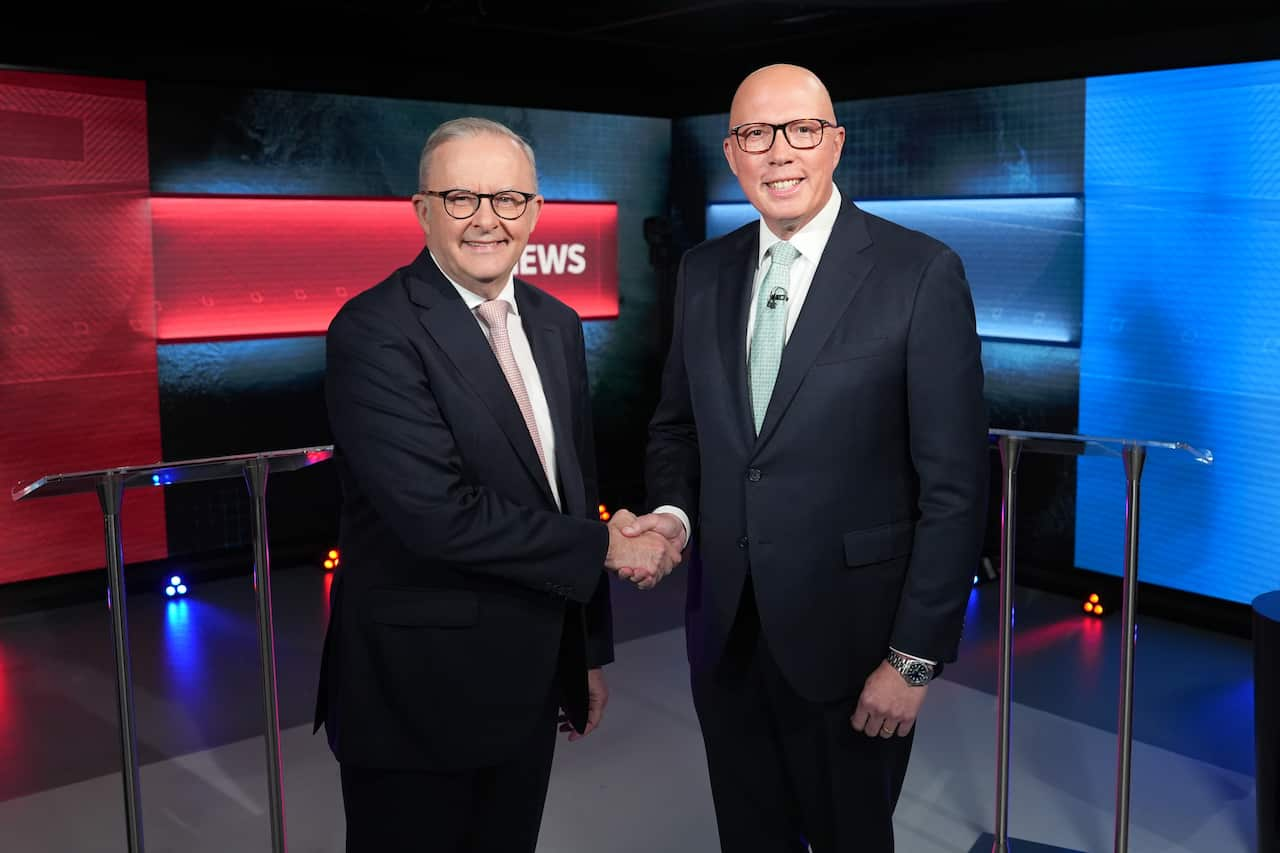
Anthony Albanese (left) and Peter Dutton shake hands ahead of the second leaders' debate. Source: AAP / ABC POOL
Labor's commitment to Uluru Statement questioned
Albanese was questioned if Labor has "moved on" from its promise of implementing the Uluru Statement from the Heart, which would include a truth-telling commission and treaty.
The first year of the Albanese government was dominated by discourse around Indigenous affairs in the lead up to the Voice to Parliament referendum, which Australians rejected in 2023.
Since the referendum's failure, the major parties have largely been quiet on the issue.
"We accept the decision of the Australian people in that referendum," Albanese said.
Albanese admits not enough is being done for First Nations people
Speers highlighted several gaps between Indigenous and non-Indigenous children, including a high suicide rate in Indigenous youth, which appears not to be budging.
Albanese admitted "neither side of politics had done well enough for First Nations people".
"That's just a fact, and that's something that breaks my heart," he said.
However, he said schemes like Labor's free TAFE — benefiting over 40,000 Indigenous people — have "created real jobs with real training and real outcomes".
Dutton agreed the figures are heartbreaking.
"I've had, in every expenditure review committee and government in Opposition, a desire to invest as much money as is required to see those terrible outcomes improve, and it hasn't happened," he said.
Dutton said there have been improvements in areas like education, noting the way the programs are delivered to communities is key to their success.
What would happen if the 'other guy won' — would it really be a disaster?
Speers put a nice twist on the usual "say something nice about each other" question. In response, the two leaders spoke about how they are able to engage and discuss issues.
But there's a kicker.
Albanese said: "Peter has taken his party to a more conservative bent than it's ever been before."
Dutton said, "We have different visions and pathways," and it "hurts" him to see young people locked out of the housing market.
Albanese questioned on the state of Trump negotiations
United States President Donald Trump has imposed 10 per cent tariffs on Australian goods with the exception of steel and aluminium, which face a 25 per cent tariff.
Albanese was questioned about what he's offering to the US to carve out a "critical minerals deal".
Albanese said the government continues to "engage diplomatically".
"We will stand up for Australia's national interest, because that is important. So we'll continue to engage with the United States," he said.
The question then turned to Dutton, who has repeatedly said he can secure a deal. Speers questioned how?
Dutton, however, gave a vague response.
"It means, as we did last time, David, we look at people with whom we have a relationship, contacts, both within the West Wing, within the administration, and those external to the administration," he said.
"I think there is the ability to do a deal."
Could Elon Musk's DOGE sink AUKUS deal?
Albanese was asked whether a contingency plan was needed on AUKUS. Albanese said "no".
"This is in the interests of both Australia and the US and the UK as well," he said.
The international trust circle
The two leaders were asked if they could trust Trump. The question made Dutton stop short.
"We trust the US, and I don't know the president [Donald Trump]. I've not met him. The prime minister obviously has been able to," he said.
Albanese responded: "Yeah. I have no reason not to. I've had a couple of discussions with him."
He said Australia had received the lowest tariff and said Trump gave Australia's appeal for an exemption "great consideration".
The host then asked if they could trust Chinese President Xi Jinping.
Albanese said: "I have no reason not to either. In terms of the discussions we have had as one on one discussions have been important. China is our major trading partner. One in four Australian jobs depends upon trade."
Dutton said: "I spoke to him across the table. I haven't done business with him and shaken hands and seen whether somebody has honoured that deal. I don't have any reason to distrust."
Dutton admits he made a mistake on Indonesia
Dutton admitted he made a mistake in saying the Indonesian president had publicly confirmed that Russia had requested to place military aircraft at a base in the province of Papua.
"The reference I was making shouldn't have been to the [Indonesian] president, it was in relation to sources from the Prabowo government," he said.
"It was a mistake."
The Indonesian president did not make a public statement about Russia's request — the report came from the military publication Janes that included unnamed sources within the Indonesian government.
"What we've seen in the last 12 hours or so is that the Russian envoy to Indonesia has confirmed that there have been discussions, and obviously, there is a concerning closeness in that relationship," Dutton said.
"I think that the main point here is that the prime minister knew nothing of it."
What do you want to be remembered for?
The two leaders revealed their ideal legacy amidst criticism they both lack vision or serious reform in their promises to voters.
Albanese's answer was "affordable childcare".
He said his government is on the way to achieving this dream, having pledged a guaranteed three subsidised days of care and scrapping the activity test for families earning less than $530,000.
"We want the universal provision of affordable childcare, so that it is as natural to have your child have access to child care as it is to have access to public school," he said.
For Dutton, it's energy, which he said is used in "everything that we rely on in our society".
The Coalition has pledged to create an east coast gas reserve, which would force exporters to set gas aside for use in Australia.
Dutton argued this, in addition to "zero-emission nuclear technology", would drive down power bills.
When will power bills come down?
Albanese was unable to answer when power bills would come down under Labor's renewable transition.
"We know that renewables are the cheapest form of power, and that is why we are doing that, rolling it out, including through gas," he said.
Speers questioned again: "When do we see the bills come down?"
"Well, what we need to do is to roll out renewables. Make sure there's energy security. Make sure it's backed up by batteries, by hydro and by gas," Albanese said.
The questions moved on, without Albanese providing a time frame.
LISTEN TO

Party Time: The Players
SBS News
29:05
Climate change impact divides leaders
Increased extreme weather events — storms, fires, floods — are on the minds of voters, who are concerned not only by their growing frequency but also by the rising insurance premiums they bring.
The leaders were asked if they accepted that Australia is experiencing the impact of climate change.
Dutton acknowledged the floods in his home state but was asked if he thought this was an indication they were getting worse.
"I'll let scientists and others pass that judgement," he said.
When Speers pressed him on the question, Dutton responded: "I don't know David, I'm not a scientist."
In contrast, Albanese said, "Science is very clear".
"Doesn't mean that every single weather event is because of climate change," he said.
"The science told us that the events would be more extreme and they'd be more frequent, and that is what we are seeing playing out. Whether it be increased bushfires, increased flooding, these extreme weather events are having an impact."
PM dismisses offshore wind community concerns
Speers asked about concerns in local communities around renewable rollouts, particularly offshore wind in places like Hunter in NSW.
Albanese said: "That's why you need proper community consultation and environmental protections."
He, however, dismissed some of the community concerns as "not real".
"Whales being unable to steer their way around in the vast Pacific Ocean around a wind tower is not right," he said.
"They've been extended further out for as a result of that community consultation process."
The $600 billion nuclear question
Dutton said his one big reform is in energy. The Coalition is pushing for a domestic gas reservation as a bridging measure while nuclear power is developed.
"I strongly believe in a zero emissions nuclear technology, embraced by the Labour Party in the United Kingdom, by the French, by many countries. Australia is the only one of the top 20 economies that hasn't signed up to or isn't already using nuclear," he said.
Albanese said the cost of nuclear energy is $600 billion, but Dutton immediately contested that figure and said it's not true.
"The prime minister whispers out the side of his mouth that nuclear is not safe. He signed up to nuclear power for our submarines ... it's another example of complete dishonesty in a debate," Dutton said.
'Young people deserve a fair crack'
Speers pointed out that young people will ultimately have to pay for the debt that election promises are racking up and asked Albanese: "What do you say to them? Where will the money come from?"
Albanese said his policies are about addressing intergenerational equity.
So why aren't the policies means-tested, Speers asked?
"We spoke before about young people. I think young people deserve a fair crack," Albanese said.
Albanese said budget repair has put the country in a better position and everyone in the country deserves access to essential services.
Coalition faces questions over public service cuts
Dutton admitted cuts to the public service, estimated to save the budget $7 billion, will not cover all of the Coalition's promises.
"The short answer is no," he said.
"We're not going to achieve all of the savings that we need to achieve through our changes to the public service."
But he struggled to answer which services would be cut, with Speers asking if foreign aid would get a cut as well.
"Our argument is that if you've got families at the moment who are working their guts out, working second, third jobs, paying tax, I want to make sure that that taxpayer dollar is being spent efficiently," Dutton said.
Albanese interjected, saying the cuts would be to "health and education".
Greens candidate addresses protesters
Liz Tilly, Greens candidate for Parramatta, addressed the crowd of pro-Palestinian activists outside the ABC.
Speakers were critical of major parties and called on voters to support the Greens and pro-Gaza independent candidates.
The protest was not audible inside the media room or in the ABC's street-level studio, 20 metres away.

Police stand outside the ABC's Parramatta office, where pro-Palestinian activists were also gathered. Source: Supplied
Why won't the major parties touch negative gearing?
Speers asked why neither party would touch negative gearing, which allows investors to offset any income from an investment property against any losses or costs involved in maintaining it.
Albanese defended his party's position.
"Because the experts say that what they potentially would do is diminish supply, not increase it, and that's why the key to fixing the housing issues is supply,"he said.
Dutton said touching negative gearing will drive up rents.
"Now, if you want to cut out negative gearing, as the Labor Party and the Greens would love to do, you will stop investment taking place for properties which ultimately are rented by young Australians," he said.
Will either leader consider giving renters more rights?
Dutton said he would support sensible reforms, but it's a matter for the states and territories.
He said he wants to support young people by giving them early access to superannuation to help them buy a house.
He maintained that it puts them in a stronger position. Critics argue the policy shortchanges people by denying them interest on their superannuation.
Albanese said the superannuation early access policy from the Opposition will just bid up the cost of houses.
He pointed to the Labor policy announced last weekend that would build 100,000 houses, which would be set aside for first home buyers.
But the reality is that there is a long lead time for the majority of these houses to be built, so they are unlikely to provide immediate relief.

The two leaders were asked if either of their parties would consider giving renters more rights. Source: AAP / ABC POOL
Who will make housing more affordable?
Speers opened the debate with a question on housing, asking if the major parties' plans would make housing more affordable or keep pushing prices up.
Albanese said the government has a comprehensive $43 billion plan, including a first home buyers scheme that will allow people to buy a home with only a 5 per cent deposit.
He said Labor is the only party with a plan to boost supply — referring to their recently announced plan to build 100,000 new homes exclusively for first home buyers as well as a broader target to build 1.2 million homes by 2029.
"The key, of course, is supply, and that's why only Labor is offering a plan at this election to increase supply of housing," he said,
Dutton said Labor has exacerbated the housing crisis with an increase in migration.
"So the demand that the prime minister has generated has really created a housing crisis," he said.
He said the Opposition has five elements to their plan, with the first element a $5 billion infrastructure fund that will unlock greenfield stock and help build 500,000 homes.
"That is, on the supply side, a very significant benefit," he said.
"The second part is that we reduce migration by 25 per cent so that we can allow the housing stock to be built up again, and by doing that, as well as stopping foreigners for two years from purchasing Australian homes."
